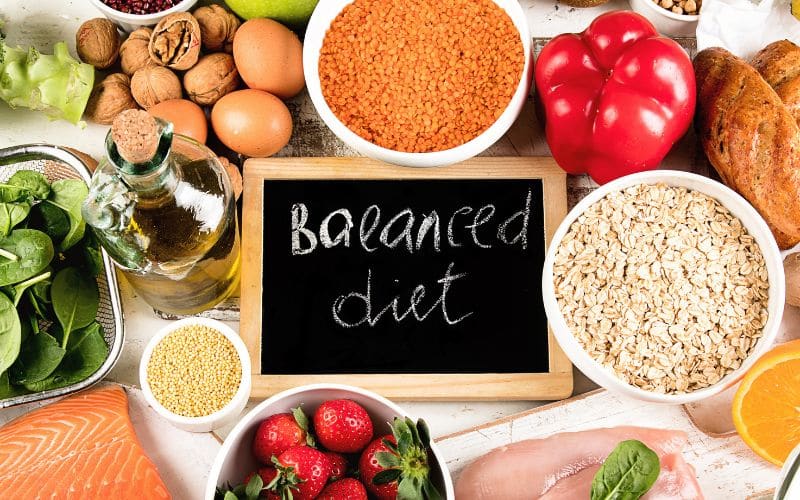A liquid diet is a type of diet that involves consuming only liquids, such as water, fruit juices, vegetable juices, and broths. This type of diet is often recommended for people who are unable to eat solid foods due to medical conditions or surgeries. However, liquid diets are also used for weight loss purposes, as they can help reduce calorie intake.
One common question that people have about liquid diets is how long they can be on one. The answer depends on the type of liquid diet and the individual's specific needs and health conditions. For example, a clear liquid diet is typically recommended for a short period of time, such as before or after a medical procedure, while a full liquid diet may be followed for a longer period of time. It's important to consult with a healthcare professional before starting any type of liquid diet to ensure that it is safe and appropriate for your individual needs.
Contents
Understanding Liquid Diets

A liquid diet is a type of diet that involves consuming only liquids, such as water, fruit juices, vegetable juices, and broths. These diets are often used for medical purposes, such as for people who have had surgery or digestive problems. They can also be used for weight loss, although they should only be followed under the supervision of a healthcare professional.
There are different types of liquid diets, including clear liquid diets and full liquid diets. Clear liquid diets only allow for clear liquids, such as water, broth, and gelatin. These diets are often used before medical procedures, such as colonoscopies or surgeries, to help clear out the digestive system.
Full liquid diets, on the other hand, allow for more variety in the types of liquids that can be consumed. This type of diet can include milk, yogurt, vegetable juice, and pureed soups. While full liquid diets can be followed for longer periods of time, they still lack many essential nutrients and should only be followed under the guidance of a healthcare professional.
Liquid diets can be effective for short-term weight loss, but they are not a sustainable long-term solution. They can also be dangerous if not followed correctly, as they can lead to nutrient deficiencies and other health problems.
In summary, liquid diets can be useful for medical purposes or short-term weight loss, but they should only be followed under the guidance of a healthcare professional. They are not a sustainable long-term solution and can be dangerous if not followed correctly.
Duration of a Liquid Diet
When it comes to liquid diets, there are two main durations to consider: short-term and long-term. Depending on the reason for following a liquid diet, the duration can vary greatly.
Short-Term Liquid Diets
Short-term liquid diets are typically recommended for medical reasons, such as before or after surgery, or to help manage certain medical conditions. These diets usually last for a few days to a week, and can provide the necessary nutrition while allowing the digestive system to rest and heal.
A clear liquid diet is often recommended for short-term use. This type of diet includes liquids that are easy to digest, such as water, broth, and clear juices. It is important to note that a clear liquid diet is not nutritionally complete and should not be followed for an extended period of time.
Long-Term Liquid Diets
Long-term liquid diets are not recommended for most people, as they can be difficult to maintain and may not provide all of the necessary nutrients for good health. However, some people may follow a liquid diet for an extended period of time for medical reasons, such as to manage certain medical conditions or to aid in weight loss.
A full liquid diet can provide more nutrition than a clear liquid diet, but it is still not nutritionally complete. This type of diet includes liquids such as milk, yogurt, and creamed soups, as well as liquid supplements. It is important to work with a healthcare professional to ensure that the diet is providing all of the necessary nutrients.
In general, long-term liquid diets should only be followed under the guidance of a healthcare professional. It is important to monitor nutrient intake and make adjustments as necessary to ensure good health.
Overall, the duration of a liquid diet depends on the reason for following it and the type of diet being followed. Short-term liquid diets are typically recommended for medical reasons, while long-term liquid diets should only be followed under the guidance of a healthcare professional.
Types of Liquid Diets
When it comes to liquid diets, there are two main types: the clear liquid diet and the full liquid diet.
Clear Liquid Diet

A clear liquid diet consists of clear liquids that are easy to digest and leave minimal residue in the digestive tract. This type of diet is often used as a preparation for medical procedures or surgeries, as it helps to clear the digestive tract and prevent complications during the procedure. Clear liquids include:
- Water
- Clear broth
- Fruit juices without pulp
- Tea or coffee without milk or creamer
- Sports drinks
- Clear sodas
- Gelatin
It is important to note that a clear liquid diet is not nutritionally adequate and should not be followed for an extended period of time. It is typically only recommended for a day or two.
Full Liquid Diet
A full liquid diet includes all the liquids allowed in a clear liquid diet, as well as some additional liquids that are more nutrient-dense. This type of diet is often used as a transition from a clear liquid diet to a solid food diet, or as a temporary diet for individuals who are unable to tolerate solid foods. Full liquids include:
- Milk
- Yogurt
- Creamed soups
- Puddings
- Smoothies
- Ice cream
- Protein shakes
A full liquid diet can be followed for several days or weeks, depending on the individual's needs. However, it is important to ensure that the diet is nutritionally adequate and provides enough calories, protein, vitamins, and minerals. It is recommended to consult with a healthcare professional or a registered dietitian before starting a full liquid diet.
Risks and Considerations
When considering a liquid diet, it is important to be aware of the potential risks and complications that can arise. Although liquid diets can be beneficial in certain situations, prolonged use can lead to a variety of issues.
Nutritional Deficiencies
One of the main concerns with a liquid diet is the risk of nutritional deficiencies. Liquid diets are typically low in calories, protein, and other essential nutrients, which can lead to malnutrition if followed for an extended period. In addition, some liquid diets may not provide enough fiber, which can lead to digestive problems.
To ensure that you are getting the nutrients you need, it is important to choose a liquid diet that is nutritionally balanced and to supplement with vitamins and minerals if necessary. Consulting with a registered dietitian can also help you develop a plan that meets your nutritional needs.
Gastrointestinal Issues
Another potential issue with a liquid diet is gastrointestinal problems. Liquid diets can cause bloating, constipation, and other digestive issues, particularly if they are high in sugar or lack fiber. Additionally, some people may experience nausea or vomiting when consuming large amounts of liquids.
To minimize the risk of gastrointestinal problems, it is important to choose a liquid diet that is low in sugar and high in fiber. Drinking plenty of water and staying hydrated can also help prevent constipation and other digestive issues.
Overall, while liquid diets can be beneficial in certain situations, it is important to weigh the potential risks and complications before embarking on a prolonged liquid diet. Consulting with a healthcare professional can help you determine if a liquid diet is right for you and develop a plan that meets your nutritional needs.
Alternatives to Long-Term Liquid Diets
While liquid diets can be effective for short-term weight loss or as part of a medical treatment plan, they are not recommended for long-term use. If you are looking for alternatives to a long-term liquid diet, here are some options to consider.
Balanced Diet

A balanced diet is essential to maintaining good health and achieving a healthy weight. This means consuming a variety of foods from all food groups, including fruits, vegetables, whole grains, lean protein, and healthy fats. Eating a balanced diet can help you lose weight and maintain your weight loss over time, while also providing your body with the nutrients it needs to function optimally.
To ensure that you are getting all the nutrients you need, consider working with a registered dietitian or nutritionist to develop a meal plan that is tailored to your individual needs and preferences. A dietitian can help you identify healthy foods that you enjoy and create a plan that is sustainable and realistic for you.
Medical Supervision
If you have a medical condition that requires a specialized diet, it is important to work with a healthcare provider or registered dietitian to develop a plan that meets your nutritional needs. This may involve a modified or restricted diet, but it should still include a variety of foods to ensure that you are getting all the nutrients your body needs.
If you are considering a liquid diet for medical reasons, it is important to do so under medical supervision. A healthcare provider can monitor your progress and ensure that you are getting the nutrients you need to maintain good health.
In summary, a long-term liquid diet is not recommended for most people. Instead, consider a balanced diet or working with a healthcare provider or registered dietitian to develop a specialized plan that meets your nutritional needs.
Frequently Asked Questions
How much weight can you lose on a liquid diet?
The amount of weight you can lose on a liquid diet varies depending on several factors, such as your starting weight, the duration of the diet, and the type of liquids you consume. However, it is not recommended to use a liquid diet as a long-term weight loss solution. While some people may lose a significant amount of weight in a short period of time, this weight loss is often temporary and can lead to health problems in the long run.
What happens if you stay on a liquid diet for too long?
Staying on a liquid diet for too long can have negative effects on your health, such as nutrient deficiencies, muscle loss, and a weakened immune system. It is important to consult with a healthcare professional before starting a liquid diet and to follow their guidelines for the duration of the diet.
Is it OK to do a liquid diet for 2 weeks?
A liquid diet for two weeks can be safe for some people, but it is important to consult with a healthcare professional before starting any type of diet. It is also important to ensure that you are consuming enough nutrients and calories to maintain your health during the diet.
What happens if you go on a liquid diet for a month?
Going on a liquid diet for a month can lead to nutrient deficiencies, muscle loss, and a weakened immune system. It is not recommended to stay on a liquid diet for an extended period of time without medical supervision.
How often do you poop on a liquid diet?
The frequency of bowel movements on a liquid diet varies depending on the individual and the type of liquids consumed. However, it is common for bowel movements to become less frequent on a liquid diet due to the lack of solid foods.
How much weight can you lose in a month on an all liquid diet?
The amount of weight you can lose in a month on an all liquid diet varies depending on several factors, such as your starting weight, the duration of the diet, and the type of liquids you consume. However, it is important to remember that rapid weight loss can be unhealthy and unsustainable in the long run.






